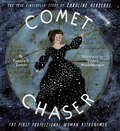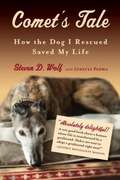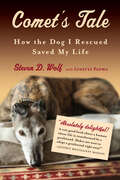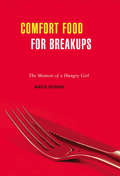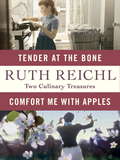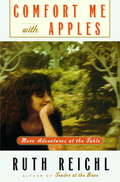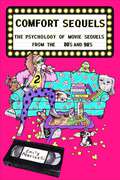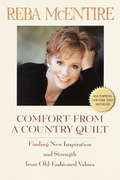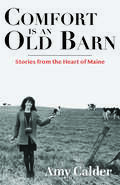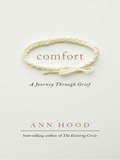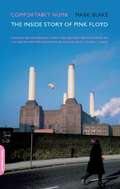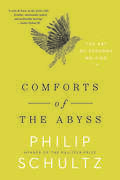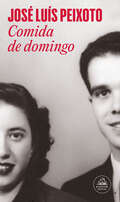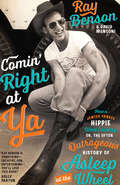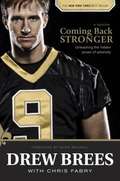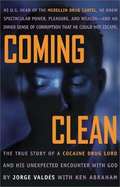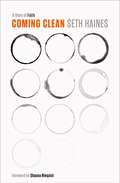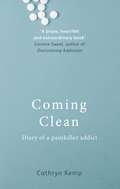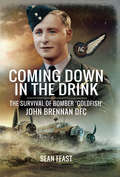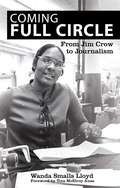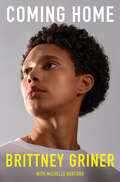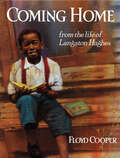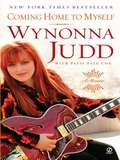- Table View
- List View
Comet Chaser: The True Cinderella Story of Caroline Herschel, the First Professional Woman Astronomer
by Pamela S. TurnerThe real-life Cinderella story of the very first professional woman astronomer—Caroline Herschel!Comet Chaser is the thrilling and beautifully illustrated biography of a woman who made a lifetime of incredible contributions to science. She was the first woman to discover a comet, the first officially recognized in a scientific role, and the first to be given a Gold Medal by the Royal Astronomical Society.In a day when girls were barely educated at all, Caroline Herschel's father taught her math and music . . . until, suddenly, he died. Her mother saw her as little more than a household servant. Caroline might have been doomed to a life of drudgery and dimness if not for her brother, who took her from Germany to England. There they started building telescopes in their free time, gradually making them larger and larger, and discovering new comets—even new planets! When the great astronomers of the day wondered how Caroline and her brother accomplished this and came to see for themselves, they found that the Herschels had made the best telescopes of their time.From household drudge to belle of the scientific ball, Caroline Herschel won international prizes never before awarded to a woman and earned a professional wage from the king. She and her discoveries remain as stunning today as they were then. Some of her calculations are still in use! In this delightfully imaginative retelling of Caroline's career, her fairy godmother is none other than her own bright intelligence, hard work, and passion for science.WOMEN IN STEM: Passion and persistence save the day and offer a wonderful model for girls seeking their way into science, technology, engineering, and math in this starry biography.AN EMPOWERING, TRUE CINDERELLA STORY: What a brilliant way of telling the story of an inspirational woman in science—as a true Cinderella story! Caroline must escape a humble life of drudgery, and with the magic of real science, she makes her own fairy-tale ending.BIOGRAPHY BOOK FOR KIDS: A great addition to classrooms and libraries, with fascinating examples of hands-on engineering, mathematics, and scientific study.INSPIRATIONAL GIFT: Inspire budding scientists of all kinds with this magical true story!Perfect for:Kids interested in science, space, or astronomyTeachers and librarians looking for excellent picture book biographies and nonfiction books about scienceGift givers hoping to inspire a love of STEM topicsFans of Hidden Figures, The Fire of Stars, and Ada Twist, Scientist
Comet's Tale: How The Dog I Rescued Saved My Life
by Steven D. WolfComet's Tale is a story about a friendship between two former winners, both a little down on their luck, who together stage a remarkable comeback. A former hard-driving attorney, Steven Wolf has reluctantly left his job and family and moved to Arizona for its warm winter climate. There he is drawn to a local group that rescues abused racing greyhounds. Although he can barely take care of himself because of a spinal condition, Wolf adopts Comet, an elegant cinnamon-striped racer. Or does Comet adopt Wolf? In Comet's Tale we follow their funny and moving journey as Wolf teaches Comet to be a service dog. With her boundless enthusiasm and regal manners, Comet attracts new friends to Wolf's isolated world. And finally, she plays a crucial role in restoring his health, saving his marriage, and broadening his definition of success.
Comet's Tale: How the Dog I Rescued Saved My Life
by Lynette Padwa Steven WolfComet’s Tale is a story about a friendship between two former winners, both a little down on their luck, who together stage a remarkable comeback. A former hard-driving attorney, Steven Wolf has reluctantly left his job and family and moved to Arizona for its warm winter climate. There he is drawn to a local group that rescues abused racing greyhounds. Although he can barely take care of himself because of a spinal condition, Wolf adopts Comet, an elegant cinnamon-striped racer. Or does Comet adopt Wolf? In Comet’s Tale we follow their funny and moving journey as Wolf teaches Comet to be a service dog. With her boundless enthusiasm and regal manners, Comet attracts new friends to Wolf’s isolated world. And finally, she plays a crucial role in restoring his health, saving his marriage, and broadening his definition of success.
Comfort Food for Breakups
by Marusya BociurkiwAn elegiac memoir about food, family, and the thorns of personal history written by a Ukrainian Canadian lesbian, whose family recipes connect intimate vignettes in which food nourishes, comforts, and heals the wounds of the past, including those of a father haunted by memories of time spent in a concentration camp during World War II. The author, both at home and in her travels through North America and Europe, also reconciles her family life with her queer identity; food becomes her salvation and a way to engage with the world. Thoughtful, sensual, and passionate, Comfort Food for Breakups muses on the ways in which food intersects with a nexus of hungers: for intimacy, for family, for home. Marusya Bociurkiw is a filmmaker and the author of three previous books.
Comfort Me with Apples and Tender at the Bone: Two Culinary Treasures
by Ruth Reichl"Reading Ruth Reichl on food is almost as good as eating it," The Washington Post Book World once declared. If that's the case, then this eBook bundle is a nonfiction feast. With a résumé that includes such posts as editor in chief of Gourmet magazine and restaurant critic for The New York Times and Los Angeles Times, Reichl has elevated the food memoir into an art form with stories that overflow with love, life, humor, and--of course--marvelous meals. TENDER AT THE BONE Growing Up at the Table "An absolute delight to read . . . How lucky we are that [Reichl] had the courage to follow her appetite."--Newsday At an early age, Ruth Reichl discovered that "food could be a way of making sense of the world." Beginning with her mother, the notorious food-poisoner known as the Queen of Mold, Reichl introduces us to the fascinating characters who shaped her world and tastes, from the gourmand Monsieur du Croix, who served Reichl her first foie gras, to those at her table in Berkeley who championed the organic food revolution in the 1970s. Spiced with Reichl's infectious humor and sprinkled with her favorite recipes, Tender at the Bone is a witty and compelling chronicle of a culinary sensualist's coming-of-age. COMFORT ME WITH APPLES More Adventures at the Table "Reichl writes with gusto, and her story has all the ingredients of a modern fairy tale: hard work, weird food, and endless curiosity."--The New Yorker Comfort Me with Apples picks up Reichl's story in 1978, when she puts down her chef 's toque and embarks on a career as a restaurant critic. Her pursuit of good food and good company leads her to New York and China, France and Los Angeles, and her stories of cooking and dining with world-famous chefs range from the madcap to the sublime. Through it all, Reichl makes each and every course a hilarious and instructive occasion for novices and experts alike, told in a style so honest and warm that readers will feel they are enjoying a conversation over a meal with a friend.
Comfort Me with Apples: More Adventures at the Table (Thorndike Press Large Print Nonfiction Ser.)
by Ruth ReichlIn Ruth Reichl’s latest book — one that will delight her fans and convert those as yet uninitiated to her charming tales — the author brings to life her adventures in pursuit of good meals and good company. Picking up whereTender at the Boneleaves off,Comfort Me with Applesrecounts Reichl’s transformation from chef to food writer, a process that led her through restaurants from Bangkok to Paris to Los Angeles and brought lessons in life, love, and food. It is an apprenticeship by turns delightful and daunting, one told in the most winning and engaging of voices. Reichl’s anecdotes from a summer lunch with M. F. K. Fisher, a mad dash through the produce market with Wolfgang Puck, and a garlic feast with Alice Waters are priceless. She is unafraid — even eager — to poke holes in the pretensions of food critics, making each meal a hilarious and instructive occasion for novices and experts alike. The New York Timeshas said, “While all good food critics are humorous . . few are so riotously, effortlessly entertaining as Ruth Reichl. ” InComfort Me with Apples, Reichl once again demonstrates her inimitable ability to combine food writing, humor, and memoir into an art form.
Comfort Sequels: The Psychology of Movie Sequels from the 80s and 90s
by Emily MarinelliThis sneaky memoir celebrates the campiness and nostalgia of some of the more infamous (some might say underappreciated) sequels of the eighties and nineties, with brand-new interviews with cast and creative team members, while at the same time emphatically conveying the restorative power these films had on the author's traumatic -- sometimes even dangerous -- upbringing. In the late eighties and early nineties, while other kids were playing softball, Emily was sporting a Pink Ladies jacket, perfecting Michelle Pfeiffer&’s &“Cool Rider&” choreography from Grease 2, and wearing out the VHS player. Comfort Sequels: The Psychology of Movie Sequels from the 80s and 90s tells stories from Emily's life, through the movie sequels of their childhood. When a film touches us, makes us deep-belly laugh, and has that feel-good spirit, we want more of it. We want the continuing story. We want the same story even, just recycled and offered in a slightly new way. What felt so good about the original can come back twofold and be the same, but different. Comfort Sequels examines the psychology behind what makes certain movie sequels memorable, safe, predictable, and comforting. These sequels are more of the universe we love—exploring something new while maintaining that which is familiar. Comfort Sequels is a sneaky memoir, celebrating the campiness and nostalgia that these films evoke. Every chapter is a love letter to a specific movie sequel. As a licensed psychotherapist and psychology professor, Emily interprets characters, story arcs, and major themes in a unique voice from a unique perspective while sharing fun and random behind-the-scenes facts about each film. Featuring interviews with Muppeteer Steve Whitmire (creator of Rizzo the Rat from The Great Muppet Caper), Christine Ebersole (My Girl 2), Stuart Pankin (Mannequin 2: On the Move), Peter Mosen (Ghostbusters II), Christopher McDonald and Leif Green (Grease 2), and the &“Cool Rider&” himself, Maxwell Caulfield (Michael, also from Grease 2). Comfort Sequels covers the following twelve comfort sequels; Grease 2, My Girl 2, Karate Kid: Part II, The Great Muppet Caper, Teenage Mutant Ninja Turtles 2: The Secret of the Ooze, Ghostbusters II, Batman Returns, Dream a Little Dream 2, Mannequin 2: On the Move, The Neverending Story II: The Next Chapter, and The Evening Star.
Comfort from a Country Quilt
by Reba McentireThe New York Times Bestseller That Reads Like a Back-Porch Conversation with Reba!In a dazzling career, Reba McEntire has become a true country superstar--and a trailblazing businesswoman with her own multimedia entertainment corporation. Yet she is a rare celebrity who is also beloved by her millions of fans for the way she lives her life. For Reba has balanced the demands of career and family, succeeded in show business without sacrificing her values, and kept up with the times without abandoning her country roots.Here Reba writes about the roles a modern woman tries to fill, roles as many and varied as the fabric pieces of an heirloom quilt. Facing the challenges of being a wife, mother, stepmother, daughter, sister, performer, executive, community member, and Christian, Reba has found inspiration and comfort in the values of her past as an Oklahoma ranch girl. In this generous and wise book, she shows how you can keep traditional values fresh and vital in your own search for a fulfilling life.Whether you read it for instant warmth or lasting inspiration, Comfort from a Country Quilt is a book that will make your spirits soar like the sweet high notes of a Reba McEntire song.
Comfort is an Old Barn: Stories from the Heart of Maine
by Amy CalderAmy Calder is an award-winning newspaper reporter and columnist, covering city government and everything from murders and car crashes to fires and drug busts. Her 34-year career started at the Waterville Sentinel bureau in Skowhegan, where she served as bureau chief for several years and chased stories from Jackman to Fairfield and Farmington to Newport. Since 2009, Calder has written a weekly human interest column, “Reporting Aside,” which appears in both the Sentinel and the Kennebec Journal. Comfort is an Old Barn is a curated collection of those columns, which include sketches of the colorful characters, quirky animals she has encountered, and special moments, as well as personal stories that make living in Maine special.
Comfort: A Journey Through Grief
by Ann Hood"Rarely do memoirs of grief combine anguish, love, and fury with such elegance." --Entertainment Weekly A moving and remarkable memoir about the sudden death of a daughter, surviving grief, and learning to love again.
Comfortably Numb: The Inside Story of Pink Floyd
by Mark BlakeMark Blake draws on his own interviews with band members as well as the group's friends, road crew, musical contemporaries, former housemates, and university colleagues to produce a riveting history of one of the biggest rock bands of all time. We follow Pink Floyd from the early psychedelic nights at UFO, to the stadium-rock and concept-album zenith of the seventies, to the acrimonious schisms of the late '80s and '90s. Along the way there are fascinating new revelations about Syd Barrett's chaotic life at the time of Piper at the Gates of Dawn, the band's painstaking and Byzantine recording sessions at Abbey Road, and the fractious negotiations to bring about their fragile, tantalizing reunion in Hyde Park.Meticulous, exacting, and ambitious as any Pink Floyd album, Comfortably Numb is the definitive account of this most adventurous-and most English-rock band.
Comforts of the Abyss: The Art Of Persona Writing
by Philip SchultzA vivid, intimate, and inspiring exploration of how to write through persona, from the Pulitzer Prize–winning founder of an influential writing school. Throughout his growth as a writer, acclaimed poet Philip Schultz has battled with the dark voice in his head—the “shitbird,” as his late friend the poet Ralph Dickey termed it—that whispers his insecurities and questions his ability to create. Persona writing, a method of borrowing the voice and temperament of accomplished writers, offers him imaginative distance and perspective on his own negative inclinations. In this candid and generous book, Schultz reflects on his early life in an immigrant neighborhood of upstate New York, his first writing experiments inspired by Ernest Hemingway and John Keats, his struggles with dyslexia, and the failures he witnessed in his father’s life and his own. Through surprising, sometimes humorous, and encouraging encounters with the writers who influence him—including Elizabeth Bishop, Joan Didion, and Norman Mailer—as well as moving experiences of loss, Schultz learns how to fashion personas out of pain. Perceptive, enlightening, and profound, Comforts of the Abyss reveals how persona writing can be used as a tool for unlocking a writer’s own story, the philosophy on which Schultz founded The Writers Studio in 1987.
Comic Acting and Portraiture in Late-Georgian and Regency England
by Jim DavisThe popularity of the comic performers of late-Georgian and Regency England and their frequent depiction in portraits, caricatures and prints is beyond dispute, yet until now little has been written on the subject. In this unique study Jim Davis considers the representation of English low comic actors, such as Joseph Munden, John Liston, Charles Mathews and John Emery, in the visual arts of the period, the ways in which such representations became part of the visual culture of their time, and the impact of visual representation and art theory on prose descriptions of comic actors. Davis reveals how many of the actors discussed also exhibited or collected paintings and used painterly techniques to evoke the world around them. Drawing particularly on the influence of Hogarth and Wilkie, he goes on to examine portraiture as critique and what the actors themselves represented in terms of notions of national and regional identity.
Comida de domingo
by José Luís Peixoto«Uno de los escritores más dotados de su país».Le Monde «Peixoto tiene una maravillosa forma de interpretar el mundo, expresado en imágenes preciosas y con un extraordinario uso del lenguaje».The Times Literary Supplement En vísperas de cumplir noventa años, el señor Rui Nabeiro rememora su vida. De fondo, el Alentejo fronterizo, donde el contrabando ha servido para resistir la pobreza: metáfora de las múltiples e imprecisas fronteras que rodean la existencia y la literatura. Lavida de Nabeiro, desde sus humildes orígenes a la creación del imperio del café Delta, es un camino que corre paralelo a la historia y la geografía portuguesas, tocadas por figuras como Marcelo Caetano, Mário Soares o Felipe González, y por la Revolución de los Claveles o la guerra civil española. El talento narrativo y la prosa lírica de José Luis Peixoto elevan esta singular biografía al estatuto de novela, en una bellísima historia de Portugal contada a través de un relato familiar. Comida de domingo es una profunda reflexión sobre la vejez y el final de una vida, pero también sobre el profundo amor de una familia reunida en torno al patriarca para celebrar su aniversario. La comida del domingo contiene una promesa: el reencuentro con los hijos, los nietos y los bisnietos. Sin ellos, el viaje vitaldel señor Rui no tendría sentido, y él sabe mejor que nadie que, aunque el final del camino esté cerca, ha sido un hermoso trayecto. La crítica ha dicho:«Siendo una novela, pero también una biografía, el autor hace una lectura de un Portugal diferente, que refleja la vida en el campo entre el período de 1931 y 2021, entre la dictadura y la democracia, de una manera tierna y amena que sentiremos como una parte de nuestra propia historia personal».Nuno Ferreira, mediotejo.net «Ya sabíamos que José Luís Peixoto es un gran escritor, principalmente porque logra extraer de la realidad una verdad y una interpretación tan limpia que casi duele, dejándonos a veces derramar más de una lágrima, pero, al mismo tiempo, es un orgullo de esta tierra, que es nuestra, también suya y más aún del comandante Rui Nabeiro».MF Perdigão Alves y António Louro Alves, Diário do Sul«José Luís Peixoto es un maestro mensajero, sin intermediarios, sin ser afectado por ruidos externos, está conectado directamente con el campo [...]. El autor utiliza la forma de biografía para construir una novela […] con una dimensión atemporal. El resultado es un negocio del que los lectores son los mayores beneficiados y que podría generar aún más beneficios si fuera la base del guion de una película, lo tiene todo. Este libro está en la estantería para ser vendido, pero, así como un producto literario va mucho más allá de la escritura, la escritura de Peixoto es mucho más que un producto literario».Joao Melo, Plataforma SobreGalveias:«Una de las revelaciones más sorprendentes de la literatura portuguesa».José Saramago «Como Saramago, José Luis Peixoto es un escritor tocado por el genio».Urbano Tavares Rodrigues
Comin' Right at Ya: How a Jewish Yankee Hippie Went Country, or, the Often Outrageous History of Asleep at the Wheel (Brad and Michele Moore Roots Music Series) (Brad and Michele Moore Roots Music Series)
by David Menconi Ray Benson&“Full of humor and humility . . . Since Benson started Asleep at the Wheel as a working-class country band, it&’s one helluva ride worth telling.&” —The Austin Chronicle A six-foot-seven-inch Jewish hippie from Philadelphia starts a Western swing band in 1970. It sounds like a joke but—more than forty years, twenty-five albums, and nine Grammy Awards later—Asleep at the Wheel is still drawing crowds around the world. The roster of musicians who&’ve shared a stage with the Wheel is a who&’s who of American popular music—Van Morrison, Willie Nelson, Dolly Parton, Emmylou Harris, George Strait, Vince Gill, Lyle Lovett, and so many more. And the bandleader who&’s brought them all together is the hippie that claimed Bob Wills&’s boots: Ray Benson. In this hugely entertaining memoir, Benson looks back over his life and wild ride with Asleep at the Wheel from the band&’s beginning in Paw Paw, West Virginia, through its many years as a Texas institution. He vividly recalls all the inevitable ups and downs and changes in personnel and describes the making of classic albums such as Willie and the Wheel and Tribute to the Music of Bob Willsand the Texas Playboys. The ultimate music industry insider, Benson explains better than anyone else how the Wheel got rock hipsters and die-hard country fans to love groovy new-old Western swing. Decades later, they still do. &“Ray Benson is something—creative, fun, entertaining—you&’ll love this book!&” —Dolly Parton &“I&’ve known Ray Benson for over forty years and never could figure out how he does all he does while asleep at the wheel! This book, however, tells how it all went down!&” —Willie Nelson
Comin' Right at Ya: How a Jewish Yankee Hippie Went Country, or, the Often Outrageous History of Asleep at the Wheel (Brad and Michele Moore Roots Music Series) (Brad and Michele Moore Roots Music Series)
by David Menconi Ray Benson&“Full of humor and humility . . . Since Benson started Asleep at the Wheel as a working-class country band, it&’s one helluva ride worth telling.&” —The Austin Chronicle A six-foot-seven-inch Jewish hippie from Philadelphia starts a Western swing band in 1970. It sounds like a joke but—more than forty years, twenty-five albums, and nine Grammy Awards later—Asleep at the Wheel is still drawing crowds around the world. The roster of musicians who&’ve shared a stage with the Wheel is a who&’s who of American popular music—Van Morrison, Willie Nelson, Dolly Parton, Emmylou Harris, George Strait, Vince Gill, Lyle Lovett, and so many more. And the bandleader who&’s brought them all together is the hippie that claimed Bob Wills&’s boots: Ray Benson. In this hugely entertaining memoir, Benson looks back over his life and wild ride with Asleep at the Wheel from the band&’s beginning in Paw Paw, West Virginia, through its many years as a Texas institution. He vividly recalls all the inevitable ups and downs and changes in personnel and describes the making of classic albums such as Willie and the Wheel and Tribute to the Music of Bob Willsand the Texas Playboys. The ultimate music industry insider, Benson explains better than anyone else how the Wheel got rock hipsters and die-hard country fans to love groovy new-old Western swing. Decades later, they still do. &“Ray Benson is something—creative, fun, entertaining—you&’ll love this book!&” —Dolly Parton &“I&’ve known Ray Benson for over forty years and never could figure out how he does all he does while asleep at the wheel! This book, however, tells how it all went down!&” —Willie Nelson
Coming Back Stronger: Unleashing the Hidden Power of Adversity
by Chris Fabry Drew BreesWhen a potentially career-ending shoulder injury left quarterback Drew Brees without a team and faced with the daunting task of having to learn to throw a football all over again, coaches around the NFL wondered, would he ever come back? After Hurricane Katrina devastated New Orleans, leaving 85% of the city under water, many wondered, would the city ever come back? And with their stadium transformed into a makeshift refugee camp, forcing the Saints to play their entire 2005 season on the road, people questioned, would the Saints ever come back? It takes a special person to turn adversity into success and despair into hope-yet that is exactly what Super Bowl MVP Drew Brees has done, and with the weight of an entire city on his shoulders. Coming Back Stronger is the ultimate comeback story, not only of one of the NFL's top quarterbacks, but also of a city and a team that many had all but given up on. Brees' inspiring message of hope and encouragement proves that with enough faith, determination, and heart, you can overcome any obstacle life throws your way and not only come back, but come back stronger.
Coming Clean
by Jorge Valdés Ken AbrahamThis is the autobiography of a man who went to prison and found Christ. This changed his life.
Coming Clean: A Story of Faith
by Shauna Niequist Seth Haines“I suppose we’re all drunk on something.”Seth Haines was in the hospital with his wife, planning funeral songs for their not-yet two-year-old, when he made a very conscious decision: this was the last day he ever wanted to feel. So he asked his sister to smuggle in some gin, and his addiction began.But whether or not you’ve ever had a drop to drink in your life, we’re all looking for ways to stop the pain. Like Seth, we’re all seeking balms for the anxiety of what we believe is an absent God—whether it’s through people-pleasing, shopping, the internet, food, career highs, or even good works and elite theology. We attempt to anesthetize our anxiety through addiction—any old addiction. But it often leaves us feeling even more empty than before.In Coming Clean, Seth Haines writes rawly through the first 90 days of a work of sobriety, illuminating how to face the pain we’d rather run from, and even more importantly, how Jesus meets us there. Because it is only when we face our anxieties with the tenacity and tenderness of Christ’s passion that we truly discover that we are indeed clean, surrendered, and whole.
Coming Clean: Diary of a Painkiller Addict
by Cathryn Kemp'A brave, heartfelt and extraordinary book' Corinne Sweet, author of Overcoming Addiction, psychologist and broadcaster What if the drugs that were meant to cure you slowly started to kill you?After falling dangerously ill with acute-on-chronic pancreatitis, Cathryn Kemp left hospital with a repeat prescription for fentanyl, a painkiller 100 times stronger than heroin.Within two years she was taking almost ten times the NHS maximum daily dose - all on prescription - and her life began to spiral out of control. Cathryn discovered she had just three months to live, unless she gave up the drug she clung to so desperately.After selling everything she owned and checking into rehab, Cathryn was told by the doctors that recovery was highly unlikely. Yet to everyone's amazement, she proved them wrong.Coming Clean is a poignant, vivid and honest memoir of a woman's struggle with, and subsequent victory over, her demons. It is a love story, a horror story, a survival story, and one that shows the very real dangers of the over-prescription of painkillers.
Coming Down in the Drink: The Survival of Bomber 'Goldfish', John Brennan DFC
by Sean FeastComing Down in the Drink is the story of Flight Lieutenant John Brennan DFC. John is an Irishman who need not have fought in the war at all. A sense of adventure took him to London where he trained as a chef before joining the RAF and qualifying as a wireless operator/air gunner.Posted to 148 Squadron in the Middle East in 1941, John was soon in the fray as the front gunner of a Wellington, flying daily sorties to Benghazi in what was known as the mail run, bombing enemy ships that were offloading vital supplies to Rommel and the Afrika Korps. As much at risk from faulty engines as enemy action, John completed a tour of almost 300 hours of operational flying, including an operation in March 1942 in which his Wellington suffered an engine failure and came down in the sea. He thus became a member of the Goldfish Club.Posted home and commissioned, he spent time instructing in Scotland, surviving yet another accident in which his pilot crashed into a mountainside. Volunteering for a second tour, John joined 78 Squadron in the summer of 1944, being crewed with one of the flight commanders. He completed his tour, this time as a wireless operator, in March 1945, by which time they were operating in daylight in support of the Allied advance. He was awarded the DFC.John is one of the only surviving wartime members of the Goldfish Club, and has a fascinating record of 63 operations that covers both the forgotten bombing war in the Middle East in 1941/42, operating from strips of sand in the barren desert, to a main force heavy bomber squadron in the snow of Yorkshire at the end of the war.
Coming Full Circle: From Jim Crow to Journalism
by Wanda Smalls LloydThis is the memoir of Wanda Lloyd Smalls, an African American woman who grew up privileged and educated in the restricted culture of the American South in the 1950s-1960s. Despite Jim Crow laws that affected where she lived, how she was educated, and what civil rights she would be denied, Lloyd grew up to realize her childhood dream of working as a professional journalist. In fact, she would eventually hold some of the nation's highest-ranking newspaper editorial positions and become one of the first African American women to be the top editor of a mainstream daily newspaper. Along the way she helped her newspapers and other media organizations understand how the lack of newsroom and staff diversity interfered with perceptions of accuracy and balance for their audiences. Her memoir is thus a window on the intersection of race, gender, culture, and the media's role in our uniquely American experiment in democracy. How Lloyd excelled in a profession where high-ranking African American women were rare is a memorable story that will educate, entertain, and inspire. Coming Full Circle is a self-reflective exploration of the author's life journey from growing up in coastal Savannah, Georgia, to editing roles at seven daily newspapers around the country, and circling back to her retirement in Savannah, where she led journalism education for a new generation.
Coming Home
by Brittney Griner Michelle BurfordOn February 17, 2022, Brittney Griner arrived in Moscow ready to spend the WNBA offseason playing for the Russian women’s basketball team where she had been the centerpiece of previous championship seasons. Instead, a security checkpoint became her gateway to hell when she was arrested for mistakenly carrying under one gram of medically prescribed hash oil. Brittney’s world was violently upended in a crisis she has never spoken in detail about publicly—until now. <P><P> In Coming Home, Brittney finally shares the harrowing details of her sudden arrest days before Russia invaded Ukraine; her bewilderment and isolation while navigating a foreign legal system amid her trial and sentencing; her emotional and physical anguish as the first American woman ever to endure a Russian penal colony while the #WeAreBG movement rallied for her release; the chilling prisoner swap with Russian arms dealer Viktor Bout; and her remarkable rise from hostage to global spokesperson on behalf of America’s forgotten. In haunting and vivid detail, Brittney takes readers inside the horrors of a geopolitical nightmare spanning ten months. <P><P> And yet Coming Home is more than Brittney’s journey from captivity to freedom. In an account as gripping as it is poignant, she shares how her deep love for Cherelle, her college sweetheart and wife of six years, anchored her during their greatest storm; how her family’s support pulled her back from the brink; and how hundreds of letters from friends and neighbors lent her resolve to keep fighting. Coming Home is both a story of survival and a testament to love—the bonds that brought Brittney home to her family, and at last, to herself. <p> <b>New York Times Bestseller</b>
Coming Home
by Floyd CooperYoung Langston Hughes was a dreamer. He dreamed about heroes like Booker T. Washington, who was black just like him. When he heard the clackety-clack of train wheels, he dreamed about the places it had been. But most of all, he dreamed about having a happy home. And so, one day, he began turning those dreams into beautiful prose. As he did, he discovered where his home really was—in the words and rhythms of his poetry that reached people all over the world. The beloved Langston Hughes comes to life in a book for poets, dreamers, children, and adults—anyone who has ever thought of what home means to them. "Teachers looking for a good way to introduce youngsters to this prominent poet will find this book to be an excellent accompaniment to his work." —School Library Journal"Like Hughes' poetry, the power of Cooper's story is that it confronts sadness even as it transcends it." —Booklist"His text is as inviting as his illustrations." —The New York Times Book Review
Coming Home to Myself
by Wynonna JuddThe no-holds-barred memoir from the beloved music superstar. From the heart of one of the most beloved performers in music comes a candid memoir of professional triumph, private heartbreak, and personal victory-a coming-of-age account of a very private search for harmony and a very public rise to fame. Coming Home to Myselfis the result of that emotional journey-a song of personal discovery that taught Wynonna Judd to love not just what she does, but who she is. From a truly exceptional woman comes an unexpected memoir of survival, strength, hope, and forgiveness, filled with an exultant and empowering message certain to resonate with those who have dreamed of finding themselves, and who only needed the courage and inspiration to begin their own journey.
